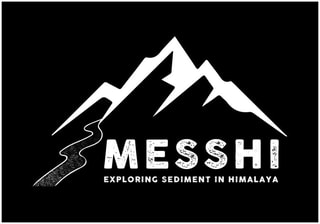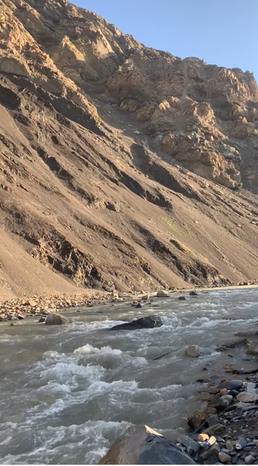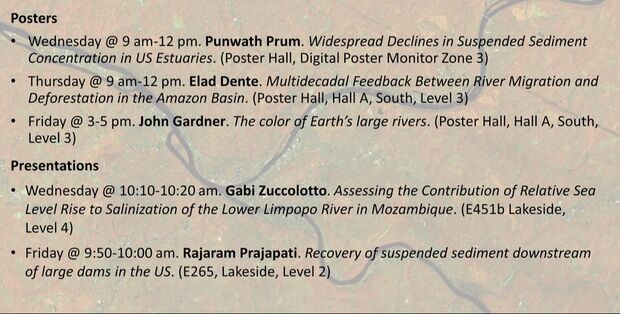|
The PhD thesis of the postdoc Luisa Lucchese received the national award of Brazil "Prêmio CAPES de Tese 2023". This traditional award is given to the most outstanding and relevant PhD thesis defended in Brazil of each of the 49 recognized knowledge areas. This year, 1,469 PhD theses defended in 2022 were submitted by the participating universities. Luisa's work received the award for the Engineering I area, which comprises Civil and Environmental Engineering. To read more about the award, visit the website https://capes.gov.br/rLUhw . To read Luisa's PhD thesis, "Modeling Landslide Susceptibility and Rainfall Thresholds
using Machine Learning methods", visit http://hdl.handle.net/10183/249991 Sam showed both previous and new work on remote sensing of chl-a and algal blooms in lakes, rivers, reservoirs in a talk titled, "New capabilities in using remote sensing data to predict algal blooms in large rivers and reservoirs".
Rob Murphy joined the group with a Pittsburgh Water Collaboratory summer internship working on visualizing water quality data (nutrients, metals, etc.) collected during citizen science sampling campaigns in stream across Pittsburgh area AND looking into the prevalence of river algal blooms with PhD student Gabi Zuccolotto.
PhD student Rajaram Prajapati recently won 2 departmental awards and CUHASI Pathfinder award to support his fieldwork and project titled Monitoring and Exploring Suspended Sediment in the Himalayas (MESSHI). Rajaram kicked off the field campaign in April combining in-situ sensors, citizen science samples, smart phones, and satellites to monitor riverine sediments.
Dr. Luisa Lucchese joined us in February after completing her PhD at UFRGS located in Porto Alegre, Brazil. Luisa is leading the development of an operational, satellite-derived riverine suspended sediment concentration database as part of a NASA-AIST project (A hosted analytic collaborative framework for global river water quantity and quality from SWOT, Landsat, and Sentinel-2), in collaboration with Colin Gleason and Subhransu Maji (UMass), Tamlin Pavelsky (UNC), and NASA JPL/PO.DAAC (Suresh Vannan, Nikki Tebaldi).
Claire Kemick joined as undergraduate researcher working on remote sensing of gross primary production in rivers. Claire graduated this spring!!! And fortunately is continuing to work with us over the summer before starting a PhD at Tulane in fall 2023
The whole group attended AGU 2022 in Chicago. The frigid air was warmed by seeing friends, science, and these excellent presentations
Congratulations to Punwath Prum who won a 2022 Limnology & Oceanography Letters Early Career Publication Honor for early career researchers! Stay tuned for Punwath's work on how estuaries around the world are changing!
We received a new NASA award for "Understanding and predicting algal blooms across networks of rivers and reservoirs" with collaborators Matthew Ross (CSU), Emily Elliott (Pitt), Jacob Zwart (USGS), Tyler King (USGS), and other USGS collaborators! We will use satellite remote sensing, continuous in-situ sensing, and process guided machine learning to develop databases of chlorophyll-a and algal bloom frequency, extent, and severity along large rivers in the Ohio and Illinois River basins and quantify the conditions over time and space that lead to blooms.
The Pittsburgh Water Collaboratory (PWC) is recruiting a full-time Research Analyst with the primary roles of building workflows for remote sensing image analysis and creating interactive data visualizations for stakeholders and public use. The main project will involve building databases of water quality on rivers and reservoirs in the Ohio River Basin using satellite imagery with a focus on algal blooms. Other projects may involve building visualizations to help stakeholders understand when and where algal blooms, why, as well as other data analysis and visualization projects on water resources in the region. See the Join The Lab page for more info, and apply here Pitt Talent Center
The Pittsburgh Water Collaboratory was awarded funding by the Hillman Family Foundation to study algal blooms on the Ohio River and their impact on drinking water using a combination of satellite remote sensing, analyzing historical samples, and data visualization. The Ohio River is a primary drinking water source for millions of people in the region. We will collaborate with Dr. Emily Elliott's group on this project over the next 2 years.
Rajaram Prajapati recently joined the lab as a PhD student! Rajaram was previously the CEO of Smartphones For Water in Nepal and will join current lab members, Punwath Prum and Elad Dente, working with our NASA NIP project understanding human and natural controls over changes in suspended sediment delivery and river meandering. Welcome Rajaram!
|
Archives
August 2023
Categories |



 RSS Feed
RSS Feed
